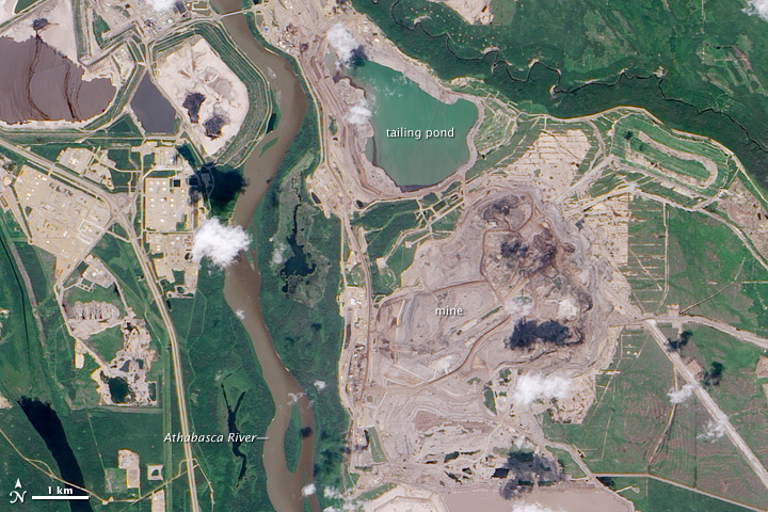Alberta’s oil sands produce one of the dirtiest oils on the planet, and they are the fastest-growing source of carbon emissions in Canada. The industry is expanding rapidly and is already responsible for more carbon pollution than all of Quebec. Oil and gas is now the largest climate polluter in the country, exceeding all greenhouse gases from transportation. Even without Teck Frontier, there are 131 megatonnes per year in approved tar sands projects just waiting for companies to begin construction. No wonder the industry is on track to take up 53% of Canada’s emissions budget within the next 10 years.
Less than two months ago, two-thirds of Canadians voted for parties vowing to do more to fight climate change. Trudeau promised during the campaign to introduce legally binding targets for Canada to reach net zero emissions by 2050. But all the current national climate policies, including a carbon tax and coal phase-out, would be overwhelmed by this carbon juggernaut and Canada would radically fail to meet its climate commitments.
Canada is not alone in this challenge. The recent Production Gap Report released by the United Nations Environment Program, the Stockholm Environment Institute and other organizations calculates the gap between planned fossil fuel expansion and Paris climate goals. The report concludes that governments are planning to produce twice as much fossil fuels than the world can safely burn. Put simply, while the world was focused on plans to reduce emissions, the oil and gas industry has been busy planning a dramatic expansion in Canada and around the world.
Last year the Intergovernmental Panel on Climate Change estimated that to give the world a 50-50 chance at safety, oil production needs to shrink by 37% in the next 10 years and by 87% by 2050. Natural gas production must decline by 25% and then 74% by mid-century. In fact the report concluded that all countries must bend the curve now – there is no room for increased emissions. There is no room for the Teck Frontier Mine.
From a climate and economic perspective, Canada clearly needs a different plan than expanding oil and gas. Such a plan means standing up to the oil industry’s unrelenting lobby and recognizing the oil sands, which already produce 2.91m barrels a day and climbing, are more than big enough.
The fact is that further investment in the oil sands is also an economic risk for Canada. Wrestling the oil out of the ground in Alberta is expensive and this multibillion-dollar project, like the controversial Trans Mountain pipeline in Canada are predicated on a $95 barrel of oil. A projection not shared by any major bank. In addition, these projects risk being stranded in a world that addresses climate change. Some of the world’s largest banks such as HSBC, the European Investment Bank and the World Bank have already made commitments not to fund the expansion of oil and gas due to climate risks and singled out the oil sands as being high carbon.
Canada’s new environment minister, Jonathan Wilkinson, on his first day on the job, said his approach would be to support the oil and gas industry by addressing the high carbon problem, not by reducing production but by reducing emissions per barrel of oil. What he failed to mention was that by his government’s own accounting there has been no industry-wide decrease in emissions per barrel for decades. This is largely because of the shift to more high intensity in situ sands projects.
In Canada and around the world the oil and gas industry is pushing “efficiency” or intensity reductions through carbon capture and storage and other technologies as the solution to rising emissions from oil and gas. We cannot afford the promise of future technologies to justify the expansion of fossil fuels that will lock the world into a high emissions future and delay the shift to renewable energy and electrification. At this moment in history it is simply not enough to plan to more efficiently burn the planet.
By rejecting the Teck mega mine, the Canadian government could signal that it is committed to stopping this runaway train. That it does represent the two-thirds of Canadians who voted for increased action against climate breakdown. It could launch a serious program to help the oil and gas workers of Alberta, the people who are out of work and need a future to believe in, by redirecting the many billions of dollars for pipelines and fossil fuel infrastructure into diversifying and decarbonizing Alberta’s economy.
In rejecting the Teck mega mine, Canada would be joining France, Costa Rica, New Zealand, Norway and recently California – all jurisdictions that have recently constrained expansion of oil and gas due to the urgent need to build cleaner safer energy systems and fight climate change.
If our children are brave enough to call it as it is and choose to take to the streets to fight for their future, don’t you think it is time that we as adults listen and step up by committing to end the expansion of fossil fuels and to fast track low-carbon progress?





